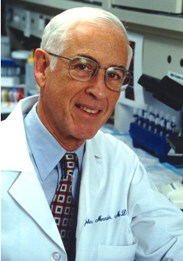The winners are Prof. John Mendelsohn from the University of Texas and Prof. Joseph Schlesinger from Yale University. The award committee for the field of the future was headed by Nobel laureate Aharon Chahanover and among its members was another Nobel laureate - Philip Sharp
 The winners are Prof. John Mendelsohn from the University of Texas and Prof. Joseph Schlesinger from Yale University. The award committee for the field of the future was headed by Nobel laureate Aharon Chachanover and among its members was another Nobel laureate - Philip Sharp.
The winners are Prof. John Mendelsohn from the University of Texas and Prof. Joseph Schlesinger from Yale University. The award committee for the field of the future was headed by Nobel laureate Aharon Chachanover and among its members was another Nobel laureate - Philip Sharp.
Yosef Schlesinger won the prize for being a pioneer in the field of signal transmission and discoveries about seeds and the growth of receptors and the way in which they stimulate the cells, developing drugs for clinical use that prevent the development of growth factors.
"We are investigating the mechanism of communication inside the cell. Signal transmission takes all kinds of biological forms, osteoporosis is a case of a malfunction in these signals. Each and every disease has something to do with the transmission of signals. A treatment that is good for one type will not be good for another. You need to identify these types and how the types work. In the future we will have drugs for all those subtypes.” Schlesinger promises.
Mendelson: "I first became interested in the field when I was in university and it opened up a career for me that would lead to medical school and I decided to dedicate my life to cancer research. I had the privilege of starting my career when they didn't deal with this issue so much. The peak moment was around 1980 when I joined a team of researchers in San Diego who were investigating the hypothesis of inhibiting the development of cancer by inhibiting growth. "I was looking for the genome that causes this. Today we have changed a paradigm, we are looking for ways to assess the risk in patients before they get the cancer, trying to detect the cancer earlier. It is possible that one day we will be able to discover the processes and know how the cancer behaves before the disease started. We cannot eliminate cancer but we can treat it effectively, we can develop new drugs. Using all the mechanisms at our disposal this is an outstanding scientific area to explore."
"Thank you from the bottom of my heart on behalf of Dr. Schlesinger and myself. Mr. David, you did a beautiful thing with this award - you brought together people from different places, from different backgrounds who all have one goal - to make the world a better place. You heard heavenly music from one of the winners of the award and also words against terrorism in a very brave way for the right of all peoples and all nations to live in peace. As for cancer, I could not say that 20 years ago, but today scientists understand the cause of cancer. Cancer results from an abnormality in gene expression and also in the repair of these genes. The Human Genome Project identified that each body has 30 thousand genes. About 500 of them are important for controlling the growth, proliferation and behavior of the cells. Other genes control other features in the body such as hair and eye color, etc. Of those 500 genes, half a dozen work improperly because of an inherited or acquired anomaly like the carcinogens in cigarette smoking. at least. (In the enclosed article, if everyone would stop smoking, about a third of the types of cancer and cancer cases would disappear. ).
"As soon as we know what the 500 genes are that control the cell's behavior for better or worse, and especially when it comes to cancer and we find which half a dozen of them are not functioning, we have a new goal: to discover the cancer earlier and also to treat it better. We were one of the few who started to develop an approach to cancer treatment while referring to the products The genome and what we have in common (the two researchers work separately from each other) is the EGF receptor. When you insert the key into the socket in the car and start there is an electrical signal that starts the car. There are receptors that are the locks of the cell and there are other substances that serve as keys. Our lab set out to try to block this signaling using a substance that acts like keyhole chewing gum. Today there are 400 different treatments. We also attack the genome and the genome products, we use antibodies, sometimes using genes that replace damaged genes and more.
